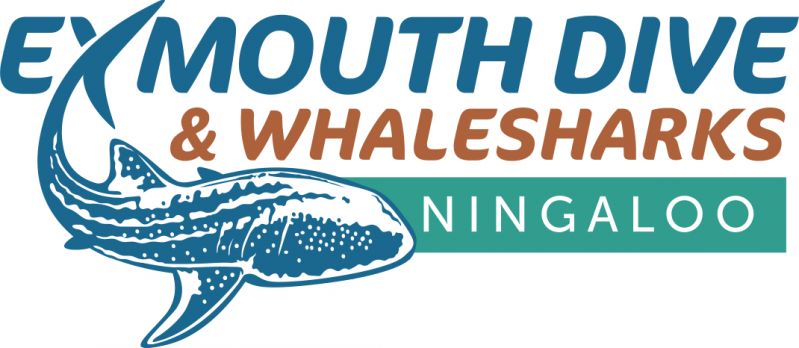In our latest Q&A with Guides, we chat with not one, but two guides! Husband-and-wife team, Mark & Debbie Ferguson, own and operate Exmouth Dive & Whalesharks Ningaloo, the region's original eco-tourism operation. Mark and Debbie have been involved in Western Australian marine ecotourism for over 20 years.
How long have you lived in the region?
Debbie: We bought the business about eight years ago, but the first time I came up here (to Exmouth) was in 2002 and Mark came up sometime in the 1990s. We actually came here for our honeymoon and went swimming with the Whale Sharks.
Mark: Because (our operation) is seasonal, we were coming up and back (from Perth) for a period of time, but now we spend most of our time here.
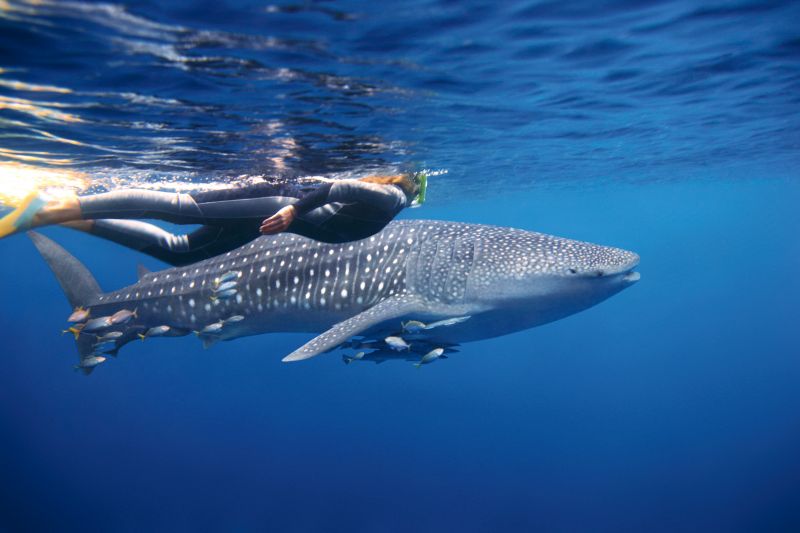 Snorkelling with Whale Sharks
Snorkelling with Whale Sharks
Can you tell me a little bit more about life before Exmouth Dive & Whalesharks Ningaloo?
Debbie: For 20 years before that, we ran a scuba diving business in Fremantle, doing scuba diving tours and courses, ecotourism, conservation, research and whale watching, all around Rottnest Island.
What do you enjoy most about your roles as wildlife guides?
Mark: Every day is an adventure - you never know what you’re going to see, you never know what is going to be there.
Debbie: With the wildlife, you’re getting to show guests the wildlife in the wild, not in a zoo.
Mark: We were doing that in Fremantle around Rottnest Island, but Ningaloo delivers more of those moments where guests say “wow, that’s just amazing!” Up here, the snorkelling blows people’s minds. You take them out on a reasonable day and they’re just absolutely blown away by the number of different species to see.
Debbie: A good example happened last week: I was on the boat, as a snorkel guide. One of our guests was a young sports teacher from Perth. He’d snorkelled before, he’d been in the water, he’s Western Australian… and he was blown away by the snorkelling here and the amazing fish he was seeing. He didn’t want to get out of the water! That was just snorkelling, it wasn’t with Whale Sharks or Humpback Whales. We were just snorkelling on amazing coral reef looking at gorgeous fish and he was just like “this is awesome!” - and he's from Perth!
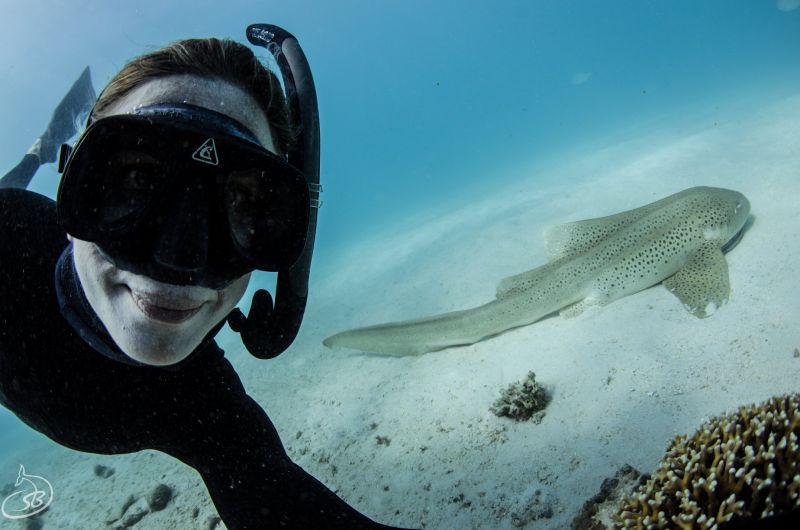 The Ningaloo Reef offers extraordinary snorkelling opportunities
The Ningaloo Reef offers extraordinary snorkelling opportunities
What about wildlife, do you have a favourite species that you love showing your guests? Obviously the Whale Shark is the big drawcard.
Mark: The Whale Sharks are an amazing thing to see. They’re just so beautiful and graceful. We also like to see the Manta Rays. Manta Rays are pretty awesome! I really like swimming with them, because they do rolls and backflips, which are really neat to see.
Debbie: The other week, we got in the water with a Manta which was all black. It didn’t care that we were there at all. He was really big and he was black, and so graceful! I love the Mantas, and I love the turtles - I do the turtle monitoring as well.
Mark: The Humpback Whales are really interesting too. Just the behaviour of the Humpback Whales is interesting. The behaviour of the Whale Sharks is generally the same - they just cruise along eating, and it is an awesome fish to see, but the Humpback Whales have a little bit more personality, and they’re a lot bigger! They interact with us, whereas the Whale Shark are concerned with feeding.
Debbie: They wouldn’t even look at you!
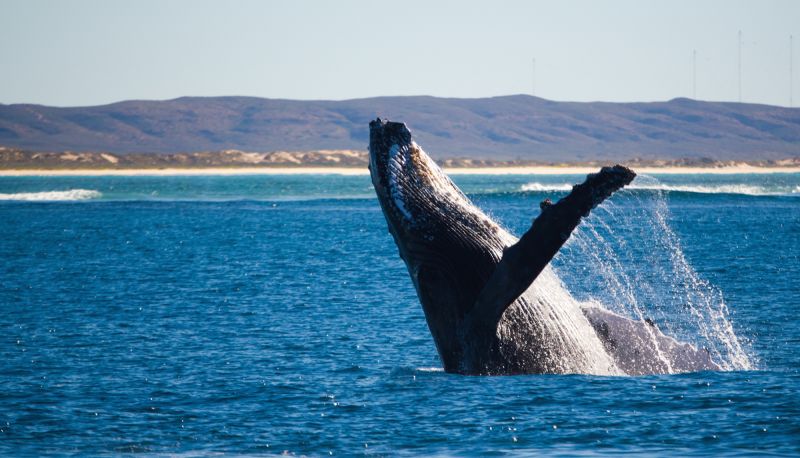 Humpback Whales visit the sheltered waters of the Ningaloo annually, between June and October.
Humpback Whales visit the sheltered waters of the Ningaloo annually, between June and October.
You work with Project Manta, can you tell us a little more about that?
Debbie: Project Manta is an organisation that does Manta Ray research. They started on the east coast of Australia in Queensland. They have an Exmouth Chapter here and we’re involved with collecting data to assist with the program.
And guests can get involved?
Mark: Yeah, it’s simply by taking a photo of the underbelly, like an ID (identification) shot. Our guests can take ID shots of the Whales as well, and also the Whale Sharks, so they can help us out with collecting the data for that.
Debbie: Each animal has their own unique identifiers. The Whale Sharks have their own dot patterns - we take photos of the left pec fin and Gil slit. With the Humpback Whale, it’s their tail and dorsal fin, and the Mantas is their belly print.
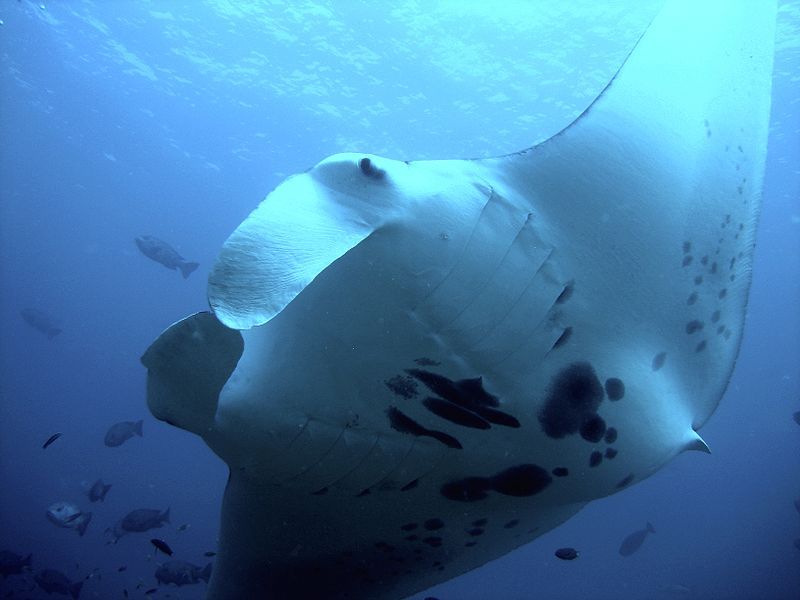 Manta Rays are identified by the unique patterns on their bellies
Manta Rays are identified by the unique patterns on their bellies
Do you notice any common reactions among your guests when they visit?
Mark: Lots of smiles and laughter! Sometimes, on a hard day, when it’s hard to get a swim with a Whale Shark or a whale, people really appreciate it and seem to be a lot more thrilled when they’re successful. On a day when there are Whale Sharks everywhere and we have six or eight swims, I don’t think people realise how unique and special it is. When it takes a third or fourth attempt at a swim, that’s when our guests realise how lucky they were to experience the encounter.
What are the most surprising things guests find about the Ningaloo Reef region?
Debbie: How remote it is! But also the amazing wildlife. I think it’s funny when guests are amazed to see a Galah - (for us) it’s almost like seeing a pigeon. We’ve got the Kangaroos, the Euros, Emus, Dingoes - and then all of the amazing birdlife. Then you’ve got the marine life and just the untouched beaches, the clean ocean.
Mark: You can pretty much go anywhere, any day of the week and you’re going to have some sort of interaction with wildlife, on land or in the sea. We’ve got endless beaches you can go and explore, and canyons too, so there’s just so much in one little area. People visiting can get quite a diverse experience.
The region is best known for the marine encounters, but what are some of the other things you can do and see on land?
Debbie: Walking through the gorges and canyons, looking for Black-flanked Rock-wallabies, all of the different types of plants here. The Mulla-Mulla, the Sturt Desert Pea. We get a lot of wildflowers here which is a surprise to many people.
Mark: We have a plant called the Birdflower, and the flower actually looks just like a bird (pictured below) - like a little hummingbird. For those interested in geology, there are some really interesting rock formations. There are an awful lot of fossils, as it used to be underwater. Along the beaches, you’ve got fossilised coral in all the rocks and there are a few fossilised Megalodon (an enormous, now extinct species of shark) teeth you can find in various locations.
Debbie: You’ve got all your raptors, there’s a bird hide here and some mangroves. In our garden, we’ve got Zebra Finches, Quails and different doves here. We even had a Western Bowerbird in our garden yesterday. So there’s that, and there’s also reptiles. Massive Bungarras (sand goannas) and ‘Tata Lizards’. The sky is stunning too - there is no light pollution here, so on a clear night, the sky is amazing.
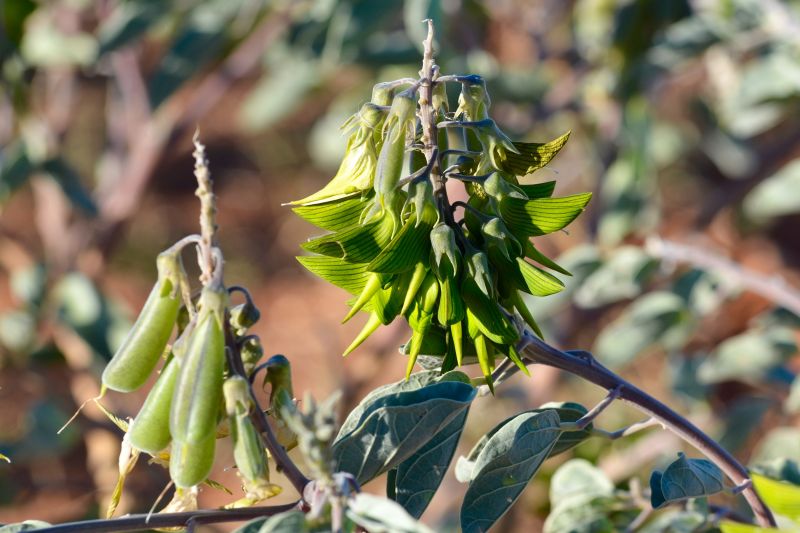 Birdflower
Birdflower
I think it’s really important that people are aware that there is so much happening in Exmouth, they really aren't travelling there solely for the marine encounters.
Debbie: We had a German dive travel agent visit us a few years ago. She had won agent of the year with a particular airline, so she had free international flights anywhere she wanted to go. She had a two-week holiday and she came out here to Exmouth in March and she asked us how long she needs with us. We told her she will need the entire time, at least 10-12 days. She thought she would run out of things to do. At the end of it, after almost two weeks, she was crying and didn’t want to leave and told us she needed to be here longer!
Given you specialise in the marine-based activities, can you recommend any operators who offer the land-based activities?
Mark: We’ve got Yardie Creek Boat Tours, Ningaloo Safari Tours who do a 4WD safari. Exmouth Adventure, they do the kayaking and canoeing - you can do three to four days with them.
Debbie: There are micro-breweries, nice restaurants, pubs. Our guests are often pleasantly surprised at the quality of the food in Exmouth - they would say “I can’t believe how good the food is! I honestly didn’t think that I would be eating really nice restaurant quality food here in Exmouth.” I think they realise that it is so remote and then expect the quality of the food to be average. The range of accommodation is great too, for all budgets. You can camp in a tent, your own camper or you can rent a cabin in the caravan park. Or you can stay in five-star resorts in town, or go out to Sal Salis, which is part of the Luxury Lodges of Australia group. Or you can just rent a house.
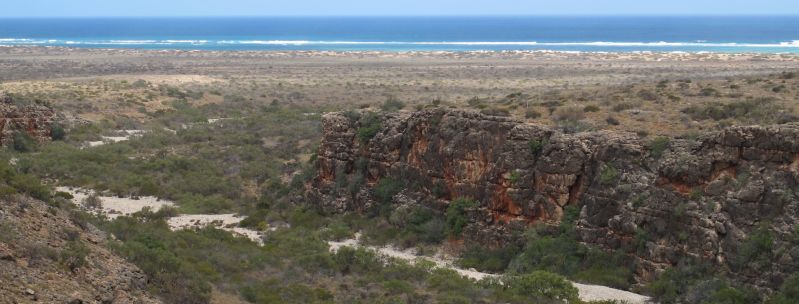 The expansive landscapes of the Ningaloo region.
The expansive landscapes of the Ningaloo region.
Have you noticed any changes to the ecosystem? Good or bad?
Debbie: Yes - there are more people visiting the region, so there is a bigger impact. There are organisations here, like Sea Shepherd - they have their own Exmouth Chapter here and are friends of ours. They do beach clean ups. I do notice, especially around school holidays, there is a little more rubbish around on the beaches and on the side of the roads.
Mark: There are also more people in the national parks, so obviously it’s busier. Number of species and volume of animals, that hasn’t really changed. It’s hard to say, because you only see what you are looking for. We’ve been looking more, so we’re finding more - but that doesn’t necessary reflect the numbers. It definitely hasn’t declined.
There is often talk about the deterioration of the Great Barrier Reef - are you noticing any similar issues on the Ningaloo Reef?
Debbie: No, our reef is really nice and healthy. There is actually proof that, during the year that the Great Barrier Reef had that bleaching event (a global crisis, caused by the increased ocean temperature), the Ningaloo Reef was not affected. We have a thing called the Leeuwin Current that forms in the ocean, and it sucks the warm water in and brings it closer to the reef. For whatever reason, that year, the Leeuwin Current was further out into the Indian Ocean, so that warm water was actually down south around Rottnest Island (off the coast of Perth), which caused some bleaching. The water temperature up here didn’t rise as usual. So, our water was cooler and whilst everywhere else was being affected by the bleaching, we weren’t.
Mark: We haven’t really had any instances of bleaching. Our temperature rarely gets more than 29℃ (84℉) in the water.
You’ve recently completed a rebrand, along with a beautiful new website - other than that, is there anything new or exciting happening at Exmouth Dive & Whalesharks Ningaloo?
Mark: We’re going to move locations. We are building a new dive shop, a new location for our office. That should hopefully be finished for the start of the next season. We’ll be on the main street of town, opposite the Ningaloo Visitor Centre.
The 2020 season will run from March 4th until October 31st.
